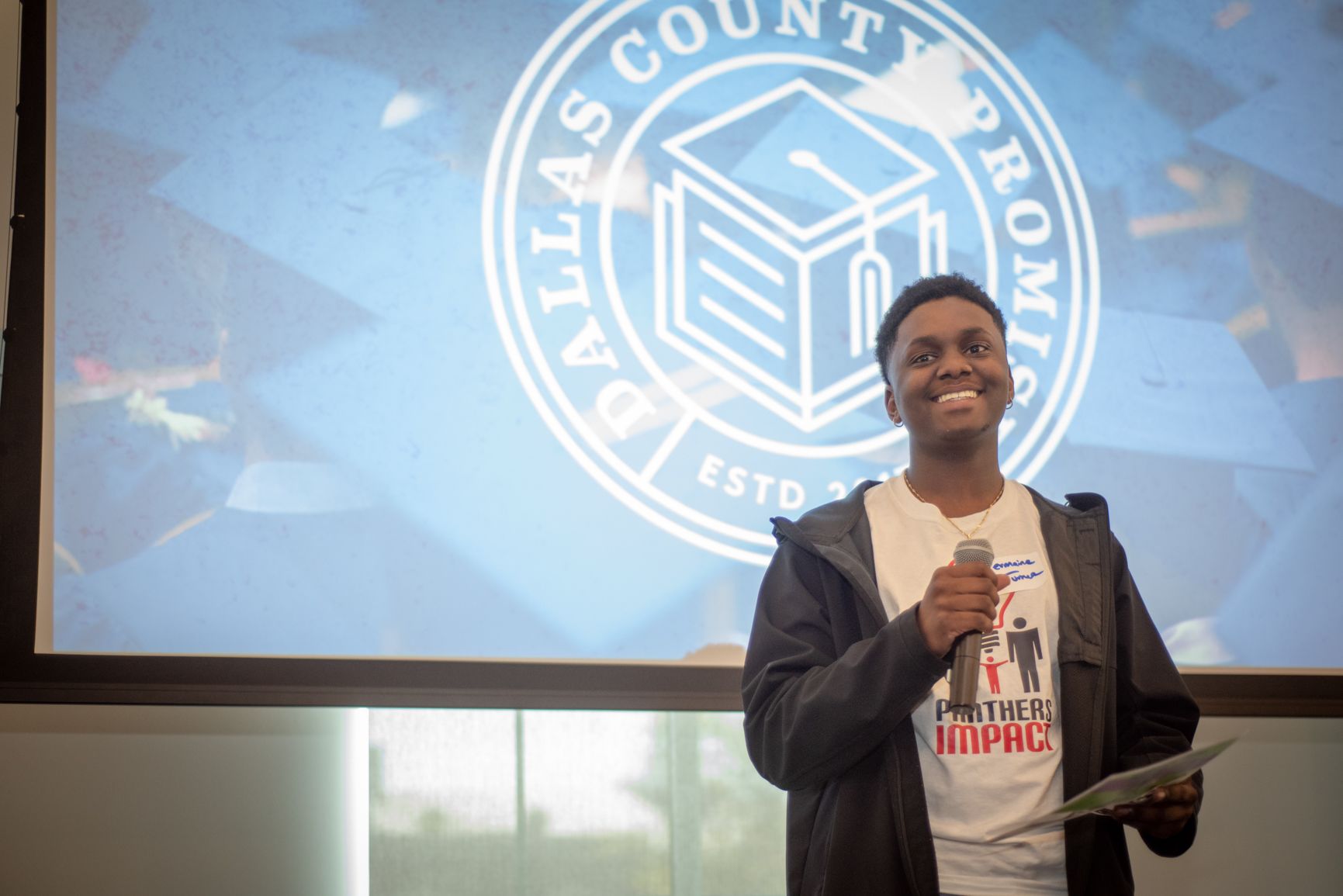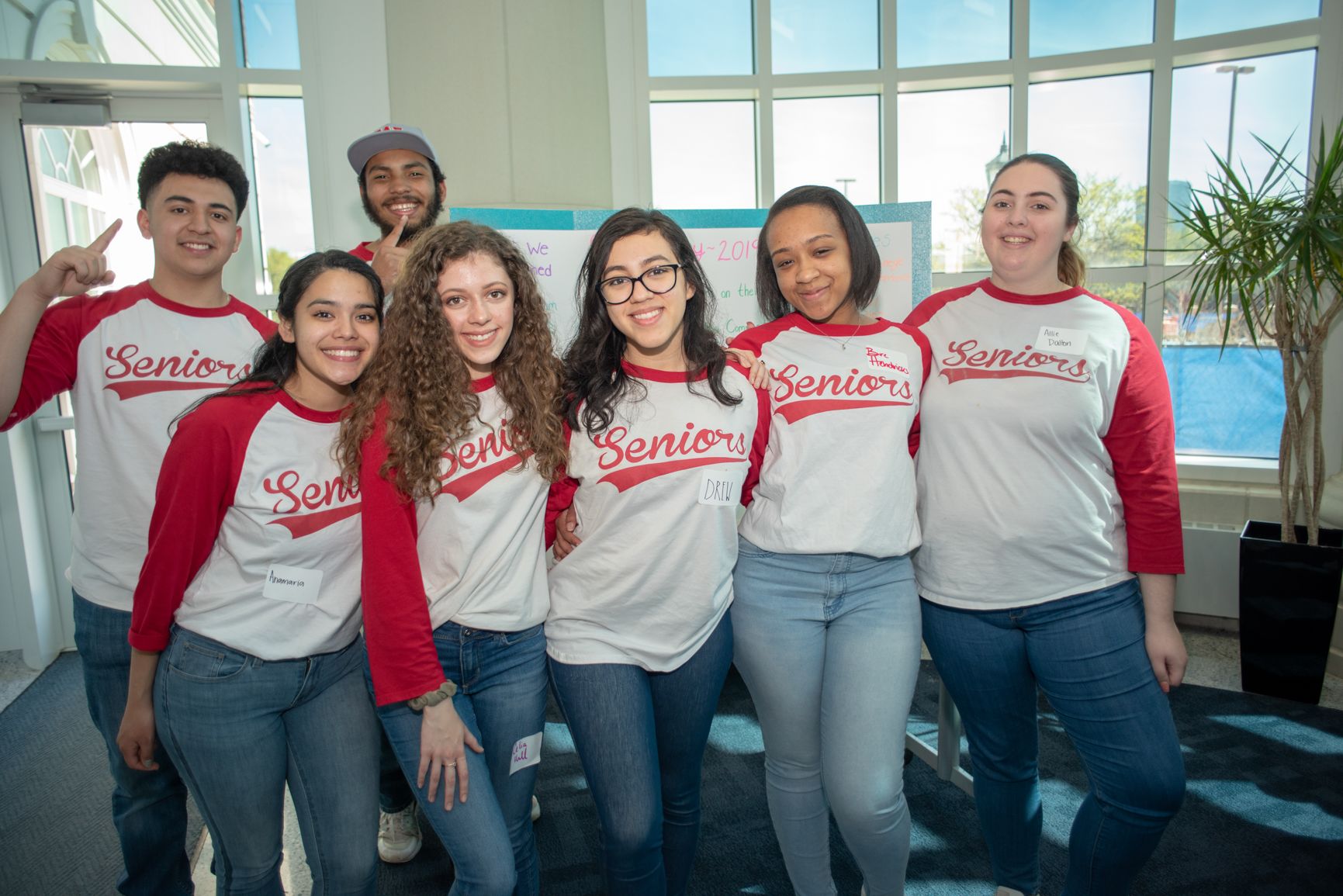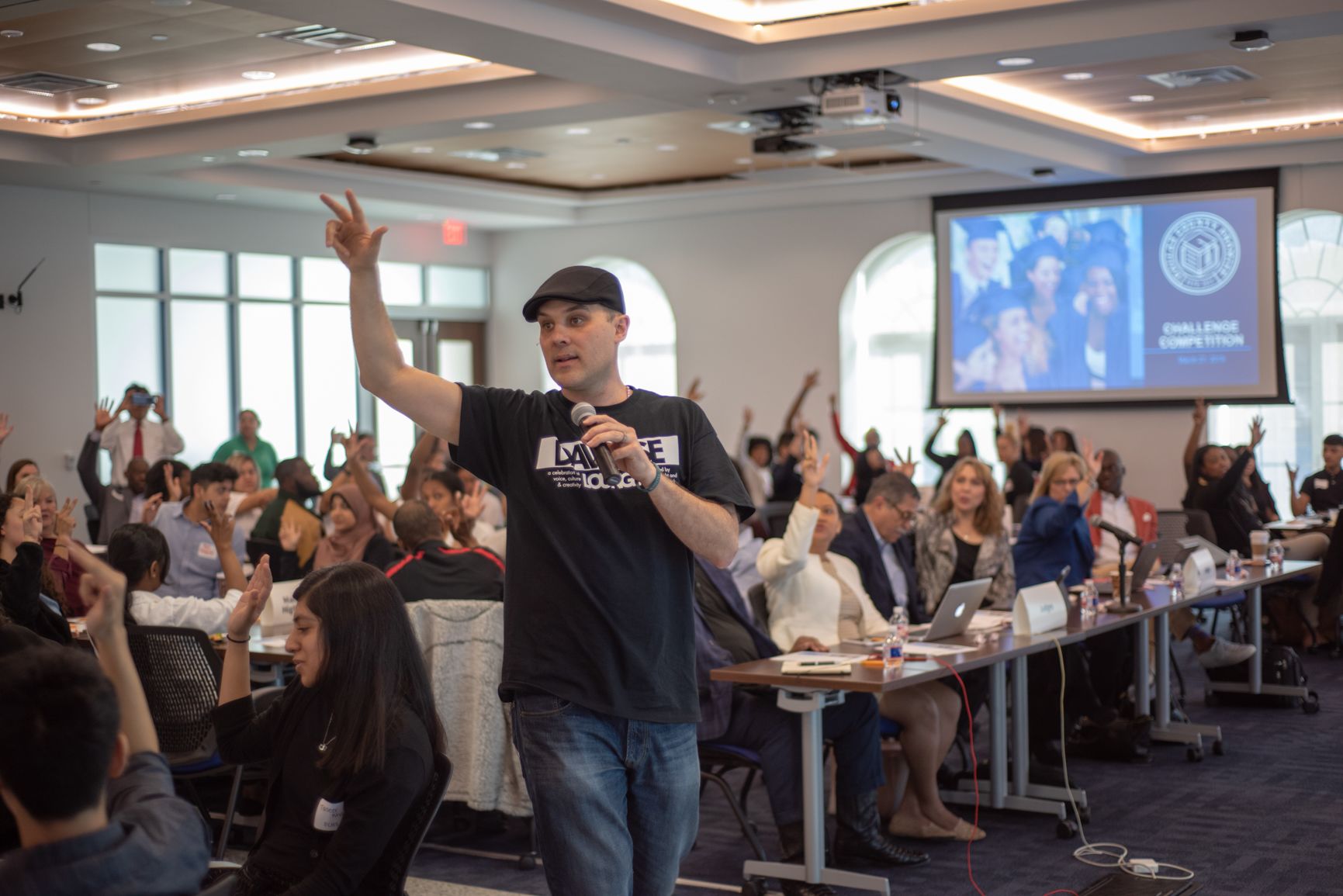In Dallas, a data-driven program helps advance equity in higher ed
A CRM platform supports underrepresented students through the admissions process

Dallas is a tale of two cities—a hub of financial and economic activity that ranks third in the nation in childhood poverty and last in economic inclusivity. Despite its thriving economy, the city is grappling with spiraling inequality, and the number of people living in poverty in Dallas County has risen swiftly over the past 15 years. Young people are particularly hard hit. Only one in four earns a living wage; and while most (65%) jobs now require a college education, just over half (54%) of high school students enroll in higher education.
That’s why in 2016 the Dallas College Foundation worked with community leaders to design a program focused on more equitable access to higher education. While previous efforts had lifted up the highest-achievers, community leaders now wanted their work to have a broader reach with a focus on high schools serving the highest number of economically disadvantaged students. Local stakeholders came together—colleges, universities, employers and local organizations—and began to look for ways to ensure all students had access to the job market. They called it the Dallas County Promise (Promise).
The Promise is one of almost 400 College Promise programs across the US, a scholarship program open to all students at participating high schools. It not only covers tuition costs but also offers high schoolers a success coach to ensure these new college students have the wraparound support they need to succeed. Underpinning the Promise is a constituent relationship management (CRM) solution, powered by Salesforce.org. It forms a crucial link between schools and colleges and gives staff a transparent view of how students are progressing.
The goal is to connect with students at every stage in the process as they finish high school and apply to college. And it’s working. Enrollment in higher ed increased by 6% each of the first two years of the program, with a decrease of 8% in the fall of 2020 following the impact of the pandemic. Dallas faired far better in the pandemic than the 30% decline in college enrollment from high-poverty high schools nationally, as reported by the National Student Clearinghouse.
An economic imperative
Dr. Eric Ban is managing director of Dallas County Promise. A former high school principal who began his career as a chemistry teacher and basketball coach, Ban explains that Promise aims to break down barriers to college enrollment and close the city’s skills gap.
Seventy-five percent of Dallas County students are economically disadvantaged, Ban observes. “If you were an economically disadvantaged eighth grader sitting in an eighth-grade Dallas County classroom, you have a 1 in 10 chance ten years from that point to complete some level of college. It’s not just a Dallas challenge. Six in 10 Texas students are economically disadvantaged and according to our state eighth grade cohort studies, these students complete college at a rate of 13% six years after high school completion, when our economy is increasingly demanding postsecondary skills.”
“I think we all realize that helping communities, particularly communities that have been underrepresented in higher education, is going to be a real economic imperative and a social imperative for our region, state, and country,” he says.
Under the Promise’s umbrella, students from 57 participating high schools take a pledge to go to college. Unique to Dallas, high school students own their academic records on an innovative blockchain technology (Greenlight Credentials), where, based on student consent, information feeds into Salesforce, which in turn receives data from higher education institutions. The platform grants students, counselors and colleges visibility on student needs in the journey from high school to college—giving students agency over their college choices, and making it easier for advisors to access information like ACT scores and other records they might otherwise have to chase down.
Those supporting students receive “critical alerts” if documents or information are missing, informing them to help students with specific needs. This transforms what Ban describes as formerly a “black box” into a transparent system, and allows counselors to quickly see which students are hitting a wall. “As simple as that sounds they didn’t have the tool to effectively case manage their students and see specific information and needs to help their students, and Salesforce is ideally organized as a robust CRM,” he says.
Building a stronger system
The wealth of data available makes it possible for educators and counselors to spotlight recurring issues, so that they can resolve them systematically. The Promise team can more easily remind students about the importance of education, sending texts, emails and surveys to the 22,000 students in the program using Marketing Cloud.
In addition to empowering students, Promise aims to strengthen the system’s capacity, acting as a connective tissue to facilitate the flow of student data from the K-12 system, to higher education and back again. Anabel Romero-Juarez is Associate Dean for Educational Programs and Partnerships at Dallas College, one of the largest community colleges in Texas. She says the link is vital. “So often, before it was like, ‘Can you send me the report?’” Now, “our high school partners have a window to what’s happening and there’s a way for us to be on the same page with our schools and our students. That’s another strength of the CRM.”
The CRM platform allows administrators to probe the data and track trends across gender, ethnicity, institution, and school location. “I can look at an individual school, I can look at a set of schools within a school district to see how they’re trending, and be really deliberate again about our recruitment and outreach services,” Romero-Juarez says.
All this enables college administrators to take a more deliberate approach to how they work to advance equity. She points out, “If you have a recruitment team of 30 individuals and you have X amount of schools and some of them are tracking relatively well, then you shift your resources to help the schools that are struggling.”

Dallas County Promise students participate in a leadership challenge at Southern Methodist University in 2019. Photo Credit: Elliott Munoz
Dallas County Promise students participate in a leadership challenge at Southern Methodist University in 2019. Photo Credit: Elliott Munoz

Photo Credit: Elliott Munoz
Photo Credit: Elliott Munoz

Dallas County Promise students participate in a leadership challenge at Southern Methodist University in 2019. Photo Credit: Elliott Munoz
Dallas County Promise students participate in a leadership challenge at Southern Methodist University in 2019. Photo Credit: Elliott Munoz
Wraparound support for vulnerable students
The impact of Dallas County Promise has been key for first-generation students, guiding them through what can feel like a warren of intricate steps. Among the millions of texts and emails the program receives, the most common questions are simple ones: Have I submitted this? And where am I in the process?
As the first in her family to go to college, Romero-Juarez understands the challenges students face. She recalls how one of her own mentors visited the family and sat at the table, taking them through the FAFSA form. Without that support, offered not just to her but to her parents grappling with an unfamiliar system, she might not have received a college education. “Those are memories that really have cemented my service, why I do what I do now,” she says.
In December of last year, the admissions team at Dallas College spotted a pattern in their student admissions data. Although they had taken a pledge to attend college, a large proportion of underrepresented high school students weren’t filling in the final items of paperwork for admission. The COVID-19 pandemic made this a particular worry, and administrators guessed that some students, confined at home without regular support, may not have had access to the help they needed to complete the admissions process.
With help from Salesforce.org technology, Dallas College was able to get a holistic view of the documents students had completed and sent in, and where they were lagging. Leaders at Dallas College asked the admissions team to reach out to the high schoolers who were behind on admissions paperwork by phone—all 1,400 of them. “All the data is available because we have Salesforce,” Romero-Juarez says.
For those students who were getting lost and needed help, she explains, “We want to check in with them; we don’t know the impact the pandemic has had on these students. Our counselors have said, it’s been a struggle to connect with their students. The rate at which they’re logging into their classes is not as high as they would like them to be.”
The data helped them make informed decisions about how to allocate resources, Romero-Juarez says. “It really forced us to look at – if they’re struggling now, then what’s that going to look like when registration opens for the new academic year?”
Long-term goals
Retaining students once they get to college and ensuring they complete their degree is an area Promise’s leaders want to focus on in the future, deploying these same CRM tools. Even when students embark on post-secondary programs, they do not always finish them. Completion rates are higher than before, but there is a long way to go, Ban says. “Three of our university presidents (at Texas Woman’s University, University of North Texas at Dallas, and Texas A&M Commerce) have come together with the Commit Partnership to design a university completion initiative where we have recently received funding to work as a community to improve student success, where both the blockchain learner record (Greenlight) and the CRM (Salesforce) are core to the work,” he says.
For a program that is just three years old, the Dallas County Promise has seen remarkable success. Promise High Schools increased college readiness, financial aid submissions, college applications, and college enrollments year over year.
In the wake of the pandemic, college enrollment saw a recent decline and early indicators like financial aid and college applications are lagging from previous years. For the first time, the US has seen unemployment increase and community college enrollment decline. Ban says, “We know that college attainment is the strongest road to economic recovery. Our community has a challenge and with tools like Salesforce, we are better equipped to work together to see, understand, and respond to the needs of students, families, and communities.”
“While data and tools are required to have a chance at achieving the equitable outcomes our community deserves, it is the strength of leadership and community here in Dallas that inspires us all to wake up energized each day to support our students.”
In the New Year, Dr. Ban is launching a new IT data and services group out of the Commit Partnership called “Economic Mobility Systems.” It will double down in Dallas and a number of other communities on building systems and community resiliency that help produce equity in college and living wage attainment. Katrina James, most recently from the Harlem Children’s Zone, has stepped in as the new Managing Director of the Dallas County Promise.
Explore how your recruiting and admissions team can find and connect with prospective students with Salesforce.org Education Cloud.



